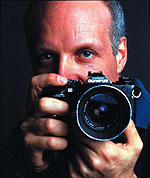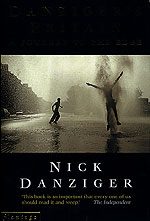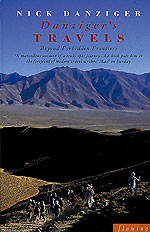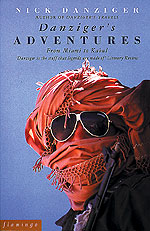Until recently, Nick Danziger was often classified as an adventure writer — a gutsy voyager who first crossed Central Asia in 1984 without visas, disguised in turban and robes, sneaking over borders, and facing multiple arrests. Before, the tales recounted in his first book, “Danziger’s Travels,” may have seemed mere spine-tingling adventures.
Now, the experience of a man who befriended the Muhajadeen rebels, and who has intimate knowledge of the people and politics of Afghanistan, provides a crucial insight into the nation at the center of the war against terrorism. Last month, the journalist and photographer discussed his experiences at WH Smith’s bookstore before an international audience, eager to gain some understanding of the current crisis.
Danziger described a country torn by years of war... Over a million Afghans have died in the conflicts that have raged in their country since 1979. Describing his first trip to the region, he said — “There was no law and order in any part of Afghanistan. Various groups were fighting for control, and soldiers would change sides often in order to survive. It was the height of the Soviet occupation. None of the warring factions seemed ideal governors, especially for women, who held a particular stake in the conflict.” Danziger recalled that women almost unanimously didn’t support the Soviet occupation. But they absolutely did not want a Muhajadeen victory, because of the restrictions imposed by the “holy warriors.”
Danziger returned to Afghanistan again and again over the next 17 years, both on the side of the Muhajadeen rebels and with the government. His most recent trip ended September 1, just ten days before the events that would unleash a new torrent of destruction on a nation already in ruins. “Afghanistan has the highest infant mortality rate in the world, and one of the lowest life expectancy rates. The conditions are absolutely atrocious. Nowhere — in Africa, South America, the Middle East or elsewhere — have I seen conditions equivalent to what is taking place today in Afghanistan.”
One of Danziger’s photos shows brightly-colored prosthetic limbs waiting to be transported to the Red Cross orthopedic center in Kabul. “It’s the only factory that continues to function in Afghanistan today,” the journalist said. “The rest of the Afghan economy is essentially run by children, because men are either out at war or have died, and women are forbidden to work. Rural areas have changed little in the past hundreds of years, and all of pre-Islamic art has been systematically destroyed. the destruction of the Buddhas earlier this year,” noted Danziger, “was merely a continuation of a policy begun in 1992.”
But Danziger warns against simplifying the current situation into good and bad, noting that “under the Northern Alliance there was looting, rape, pillaging and fighting between the various factions.” He added that the restrictions on women, so reviled by the West, are not exclusive to the Taliban. “Ten days before my arrival three adulterers were stoned to death in an area controlled by the Northern Alliance.”
Although he says that “part of my heart and my home is in places like Afghanistan,” the author confronts the subject of hardship in all corners of the world. In another book, “Danziger’s Adventures From Miami to Kabul,” he takes a look at poverty in the US and UK comparing them to the ravages of the Third World. The photographs in Danziger’s latest book, “The British,” expose the contrasts between rich and poor in his homeland.
Still, Danziger is particularly drawn to the plight of Afghanistan, and hopes to return there this winter. “That’s when people should be there, because that’s when it will be really difficult for Afghans to stay alive.”
Books by Nick Danziger: “Danziger’s Travels,” “Danziger’s Adventures,” “Danziger’s Britain,” and “The British,”all available at WH Smith.







